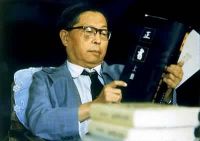Cao Yu
Cao Yu (Chinese: 曹禺) was born as Wan Jiabao was a renowned Chinese playwright, often regarded as China's most important of the 20th century.
Biography
Cao was born on September 24, 1910 in Tianjin. His ancestral home was Qianjiang, Hubei Province. In 1922 he entered Nankai High School where he joined the student-run Nankai Modern Troupe and three years later, began to perform in such productions as Ding Xilin's Oppression and Ibsen's A Doll's House.
Upon graduation from Nankai High School in 1928, Cao Yu was admitted to the department of political science at Tsinghua University in Beijing. Two years later, he transferred to the department of foreign literature and in 1933, while still a student, Cao Yu published his maiden work Thunderstorm. The play is set in the home of a northern China industrialist in the 1930s and is devoted to exposing the crime and tragedy of the old society. It was very successful at its premier production.
Shortly after graduation from university, Cao Yu went to teach English at a high school in Baoding, but soon thereafter returned to his Alma Mater as a post-graduate student. The following year, he went to teach at Hebei Women's Normal College in Tianjin, and in the summer of 1935, the young dramatist turned out his second play. Sunrise exposes the dark reactionary rule of the time and prophesies its inevitable doom. The play won a literary prize awarded by the newspaper L'impartiale in 1936.
Before long, Cao Yu was transferred to Nanjing Drama School, and in the same year, finished his third major work. The Wilderness tells a legendary tale of a young farmer, Qiu Hu, who takes revenge on the son of a landlord who stole his lover. Influenced by Eugene O'Neill, this play employs techniques of romanticism and symbolism.
When the War of Resistance against Japan began, Cao Yu moved to Sichuan Province with the drama school. In this period he produced plays which reflected the life of the people who rose to fight against the Japanese invaders in the rear areas. Transformation is one of the more famous from that time.
In 1940 Cao Yu finished Peking Man, a play about the struggle between old and youth in a declining feudalistic family. Soon after resigning his teaching post at the drama school in 1942, Cao Yu moved to Chongqing, where he became a council member of the All-China Resist-the-Enemy Federation of Writers and Artists, working first as an editor with a drama magazine and then as a screen writer in a film studio.
In 1946, Cao was invited, along with Lao She, a well-known novelist, to give lectures in the United States. He returned to China the following year and took on the job of screen writer and director at the Wenhua Film Studio in Shanghai. His first feature film is entitled Bright Day.
At the founding of the People's Republic of China in 1949, Cao came to Beijing, where he soon became the vice-president of the Central Academy of Drama. He was later made president of the Beijing People's Art Theater when it was set up in 1952. in 1954, Cao completed Bright Skies, a play devoted to the ideological remolding of intellectuals in a city hospital. It won a first-class prize at the first session of the National Performing Meeting of Spoken Drama held in 1956.
After a ten-year silence during the Cultural Revolution, the veteran playwright took up his pen once again and published The Consort of Peace (the consort being Wang Zhaojun) in 1978. According to convention, Wang Zhaojun had been depicted as a tragic role, but under Cao Yu's pen the protagonist became a positive image who worked to unify the Han and minority nationalities. The play aroused controversy in theatrical circles on account of this change.
Cao Yu died on December 13, 1996.
Works
His main work include Sunrise (1935), Thunderstorm (1936), The Wilderness (1937), Transformation (1940), Peking Man (1941), Family (1942), Bright Day (1948), Bright Skies (1956), Ying Chun Ji (1958), and The Consort of Peace (1978).
References
On Cao Yu (1943)
Source Materials on Cao Yu (1960)
"The Playwright Tsao YU" (1963)
"In the Limelight Again" (1980)
On the Art of Cao Yu's Play-writing (1984)
A Chronicle of Cao Yu's Life (1985)
On Cao Yu (1986)
On Cao Yu's Play-writing (1987)
A Biography of Cao Yu (1988)
An Exploration of Cao Yu's Play-writing Art (1988)
"Theater Honors a Great Dramatist" (1990)
"Books Reveal Dramatist Cao Yu's Realist Works" (1990)
